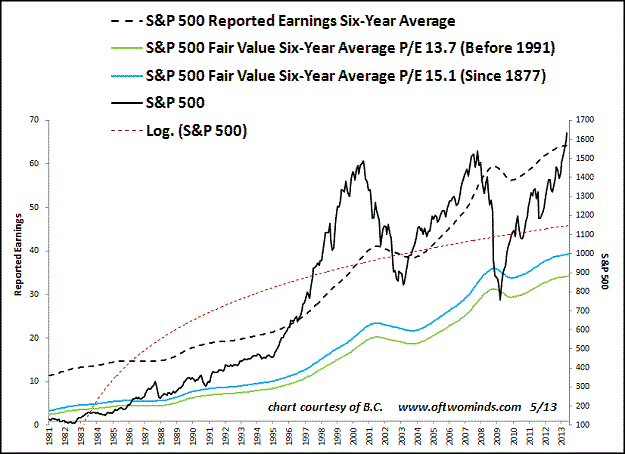A Funny Thing Happened on the Way to the Next Bull Market
Giddy "buy the dip, the Fed's got our back" participants tend to forget that major players profit from going short when all the other shorts have been terminated with extreme prejudice.


During the previous unreal estate and stock echo bubble I, the SPX rose 14 out of 17 months from Jun '06 to Oct. '07, 8 months in a row during the initial increase.Leading up the the tech bubble high in Mar. '00, the SPX rose 12 out of 19 months from the Sept. '98 low, 8 out of 10 months during the initial increase.
The SPX rose 12 months into the '87 high, 10 of 12 months being higher.
From the low in Nov. '71, the SPX rose 13 months into high in Jan. '73, 11 out of 13 months being higher.
Into the 1937 high, the SPX rose 21 of 25 months from the low in spring 1935.
The blow-off move into the 1929 high was up 16 months in a row and 18 out of 20 months.
We're in the 12th month of an uptrend since Jun '12, 11 of which have been up.
It's been 20 months since the Oct. '11 low, 16 of which have been higher.
The current bull market move is among the strongest, most persistent in US history, rivaling the increases into the 1929 and 1937 highs.
The SPX is 65-85% above implied fair value based on the 6-year change of reported earnings and the avg. P/E of 13-15.
The central banks have yet again created a stock market bubble rivaling or surpassing the most overvalued secular bull market peaks in history, and this time they REALLY mean it.
New video with CHS and Gordon Long: Peak Consumption (27:30)
Things are falling apart--that is obvious. But why are they falling apart? The reasons are complex and global. Our economy and society have structural problems that cannot be solved by adding debt to debt. We are becoming poorer, not just from financial over-reach, but from fundamental forces that are not easy to identify or understand. We will cover the five core reasons why things are falling apart:
 1. Debt and financialization
1. Debt and financialization2. Crony capitalism and the elimination of accountability
3. Diminishing returns
4. Centralization
5. Technological, financial and demographic changes in our economy
Complex systems weakened by diminishing returns collapse under their own weight and are replaced by systems that are simpler, faster and affordable. If we cling to the old ways, our system will disintegrate. If we want sustainable prosperity rather than collapse, we must embrace a new model that is Decentralized, Adaptive, Transparent and Accountable (DATA).
We are not powerless. Not accepting responsibility and being powerless are two sides of the same coin: once we accept responsibility, we become powerful.
Kindle edition: $9.95 print edition: $24 on Amazon.com
To receive a 20% discount on the print edition: $19.20 (retail $24), follow the link, open a Createspace account and enter discount code SJRGPLAB. (This is the only way I can offer a discount.)
| Thank you, Herb S. ($100), for your outrageously generous contribution to this site -- I am greatly honored by your steadfast support and readership. | Thank you, James M. ($50), for your supremely generous contribution to this site -- I am greatly honored by your steadfast support and readership. |



























